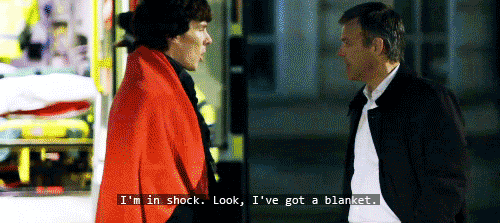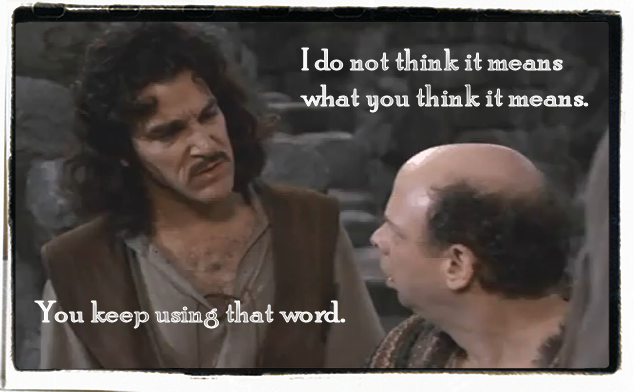All right, so you know... TV, while fun and entertaining, is not always the most accurate. For me, this is most obvious in medical scenarios. So without further ado, for your enjoyment, my top 5 TV medicine pet peeves...
5- "Stay awake! Stay with me!" "Don't close your eyes!" "Stay awake!"
This is only necessary if you're, like, in the wilderness and the sick/injured person has to stay awake so they can keep walking to safety. Otherwise, falling unconscious can actually be a protective mechanism (your brain requires less oxygen, your heart rate slows, etc.). It's often a sign of badness, yes, and you want to fix the underlying problem, but falling unconscious doesn't do anything bad to you in and of itself.
4- Have you ever had to get blood drawn? Did the phlebotomist ever have trouble finding your vein? Then you should realize that you can't just stick a needle randomly into someone's arm or neck, depress the syringe, and expect the contents to go into a vein. First you have to actually, y'know, find the vein.
3- "Mental hospital" or "psych ward" is code for "prison without trial for anyone who shows the least sign of being crazy," right?
Actually (surprise surprise) WRONG.
First, inpatient psychiatric facilities are not creepy prisons where the walls are all padded, everyone wears white, and the staff leers menacingly at you. They're actually pretty nice, as hospitals go. They typically have soothing decor, comfy couches, and everyone wears regular clothes. Psychiatrists are generally extremely nice people.
Restraints are NEVER used unless someone is actively trying to physically harm themselves or someone else, and there is NO other effective option. And patients are never just left in them for extended periods of time. (That's illegal, actually. There are extremely strict guidelines as to when and how physical restraints are used.)
Second, the ONLY time you can be admitted to an inpatient psychiatric unit without your consent-- unless you committed a crime related to your mental illness and it's either the "psych ward" or jail-- is if you're a danger to yourself or someone else... that is, actively suicidal or homicidal (or an undeniable danger by your actions, even if you're not strictly intending harm).
So, let's review-- can the following people be admitted (not committed, guys, what century is this?) to an inpatient psych unit without their consent?
- Depressed man who is considering suicide but does not have a specific plan to kill himself? NOPE.
- Actively psychotic woman who hears voices that tell her she's on a mission from alien beings? NOPE.
- Bipolar man in a manic state who's spending himself to the poorhouse betting on horse races? NOPE.
- Schizophrenic woman who believes that food is poison and so is slowly starving to death? MAYBE. But they will have to try outpatient treatment FIRST.
- Delusional man who is planning to shoot his coworker tomorrow because he thinks he is a terrorist? YES.
- Depressed woman who tried to overdose on prescription painkillers in a suicide attempt? YES.
Also, on a related note, electroshock therapy is NOT painful (patients are sedated beforehand, as well as given a muscle relaxant so there are no terrifying convulsions), NEVER done against a patient's will, and is actually SUPER AMAZINGLY EFFECTIVE for treating severe, intractable depression.
2- "Give him some space, he's in shock." "Please, officer, can this wait a minute? She's in shock!"
What shock means in medicine:
Dangerously low blood pressure leading to organ damage, either due to infection, blood loss, dehydration, anaphylaxis, severe heart disease, or central nervous system damage.
What shock does not mean in medicine:
Someone is confused/stunned after experiencing something psychologically traumatizing.
Moral of the story: if she's "in shock," somebody better be placing two large-bore IVs and running some fluid boluses stat.
And my Number One TV Medicine Pet Peeve....5- "Stay awake! Stay with me!" "Don't close your eyes!" "Stay awake!"
This is only necessary if you're, like, in the wilderness and the sick/injured person has to stay awake so they can keep walking to safety. Otherwise, falling unconscious can actually be a protective mechanism (your brain requires less oxygen, your heart rate slows, etc.). It's often a sign of badness, yes, and you want to fix the underlying problem, but falling unconscious doesn't do anything bad to you in and of itself.
 |
| Important to stay awake in this scenario. Otherwise, if you're injured, pass out if you want. |
4- Have you ever had to get blood drawn? Did the phlebotomist ever have trouble finding your vein? Then you should realize that you can't just stick a needle randomly into someone's arm or neck, depress the syringe, and expect the contents to go into a vein. First you have to actually, y'know, find the vein.
 |
| Sorry, Sam. Doesn't work this way. You're just infiltrating that purified blood. |
3- "Mental hospital" or "psych ward" is code for "prison without trial for anyone who shows the least sign of being crazy," right?
 |
| Clark Kent would agree. |
First, inpatient psychiatric facilities are not creepy prisons where the walls are all padded, everyone wears white, and the staff leers menacingly at you. They're actually pretty nice, as hospitals go. They typically have soothing decor, comfy couches, and everyone wears regular clothes. Psychiatrists are generally extremely nice people.
 |
| A room in a real-life psychiatric hospital. |
Second, the ONLY time you can be admitted to an inpatient psychiatric unit without your consent-- unless you committed a crime related to your mental illness and it's either the "psych ward" or jail-- is if you're a danger to yourself or someone else... that is, actively suicidal or homicidal (or an undeniable danger by your actions, even if you're not strictly intending harm).
So, let's review-- can the following people be admitted (not committed, guys, what century is this?) to an inpatient psych unit without their consent?
- Depressed man who is considering suicide but does not have a specific plan to kill himself? NOPE.
- Actively psychotic woman who hears voices that tell her she's on a mission from alien beings? NOPE.
- Bipolar man in a manic state who's spending himself to the poorhouse betting on horse races? NOPE.
- Schizophrenic woman who believes that food is poison and so is slowly starving to death? MAYBE. But they will have to try outpatient treatment FIRST.
- Delusional man who is planning to shoot his coworker tomorrow because he thinks he is a terrorist? YES.
- Depressed woman who tried to overdose on prescription painkillers in a suicide attempt? YES.
Also, on a related note, electroshock therapy is NOT painful (patients are sedated beforehand, as well as given a muscle relaxant so there are no terrifying convulsions), NEVER done against a patient's will, and is actually SUPER AMAZINGLY EFFECTIVE for treating severe, intractable depression.
2- "Give him some space, he's in shock." "Please, officer, can this wait a minute? She's in shock!"
What shock means in medicine:
Dangerously low blood pressure leading to organ damage, either due to infection, blood loss, dehydration, anaphylaxis, severe heart disease, or central nervous system damage.
What shock does not mean in medicine:
Someone is confused/stunned after experiencing something psychologically traumatizing.
Moral of the story: if she's "in shock," somebody better be placing two large-bore IVs and running some fluid boluses stat.
 |
| Nope. Sherlock, you really should know better. |
1- Picture this scene (you know you've seen it many a time):
A terrible accident has occurred, and now a character you've come to know and love is lying in a hospital bed, barely clinging to life (and, I might add, looking remarkably attractive and well-groomed for someone so Critically Ill... usually without even a nasal cannula, much less an endotracheal tube, to spoil the effect).
Suddenly the rhythmic beeping in the background gives way to an ominous hum, and you know the terrible truth. The heart monitor swings into view to show you the all-too-recognizable flatline.
Instantly, doctors and nurses rush in. What's the first thing they do? Check the Airway, Breathing, Circulation? Start chest compressions? No way, baby, because in medical drama there is nothing more glamorous than the all-powerful defibrillator. One of the (also remarkably attractive) doctors grabs those paddles, slams them on the patient's bare chest, yells "CLEAR!" and the patient jerks violently.
(Note: Even if they do attempt CPR, they do terrible compressions-- too slow, too shallow-- and on a soft surface. If you're doing compressions on a bed without a board behind the patient, you're not compressing their heart, you're just compressing the mattress.)
Lather, rinse, repeat. This goes on for a grand total of about 30 seconds (despite the fact that real codes can last more like 30 minutes at times... and do, in fact, typically involve chest compressions) before the Doctor In Charge wipes his/her brow, fights back tears, and says, forcing stoicism, "Call it."
So what is the pet peeve here? The unlikely attractiveness of... well, everyone? The fast-forwarded code blue? The lack of oxygen therapy (or any kind of medical device) on a patient who is evidently Hovering Near Death? Actually, no.
People. Asystole is NOT a freakin' SHOCKABLE RHYTHM!




Hilarious. It's amazing how much TV medical nonsense is detectable if you even had a first aid class in Junior High, let alone a medical degree. Any time a medical situation pops up on the screen my pulm/critical care husband slowly begins to decompensate: "forget about the oxygen and IV...guys...guys! How about you START BY PUTTING PRESSURE ON THE GUNSHOT WOUND! AAAGGGHHHH!" His other favorite objects of ridicule are pathetic CPR, an insistance on dramatically cleaning wilderness wounds with vodka when water would do, the firm belief that one treats all wounded or sick individuals by dabbing their brow with a cloth (*snide voice* "Dab dab...dab dab...dab dab"), and Hollywood's mistaken impression that all doctors know everything about medicine - the Family Medicine guy who mysteriously knows what neurology attendings are still learning, or the detective's doctor sidekick who's a brain surgeon but is of course familiar with the minutiae of preemies in the NICU.
ReplyDelete